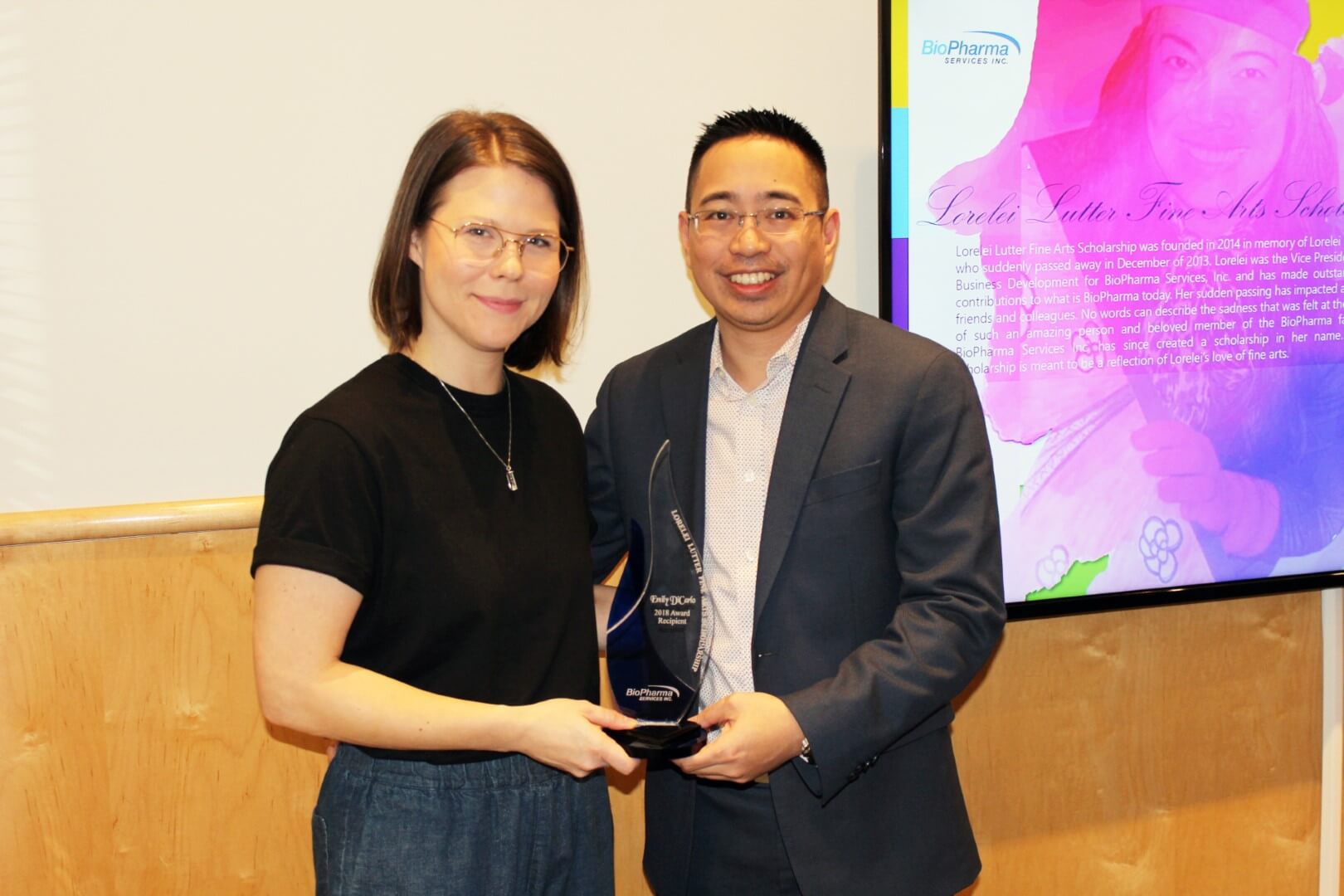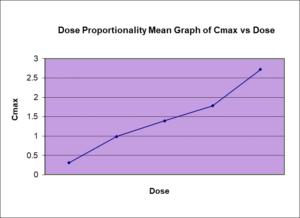BioPharma Services INC. BPSI Announces 2018 Recipient Of Lorelei Lutter Scholarship

BioPharma Services Inc. (BPSI) announces the 2018 recipient of the Lorelei Lutter Fine Arts Scholarship (LLFAS) in memory of Lorelei Lutter, VP Business Development. The scholarship is meant to be a reflection of Lorelei’s love of fine arts.
“I am very pleased to award Emily DiCarlo with the Lorelei Lutter Fine Arts Scholarship. Emily has displayed tremendous talent in Visual Studies, as a Professional Artist exhibiting both locally and abroad, as well as in Writing, as a published Writer and Art Critic” — commented Louis Co, VP Global Clinical Operations of BioPharma Services Inc.
The scholarship will be awarded on December 13, 2018 to Emily DiCarlo, daughter of Renzo DiCarlo, CEO.
As a Professional Artist, Emily has exhibited both locally and abroad including, but not limited to MU Artspace in the Netherlands, NXNE Music Festival, Artscape Youngplace, Lakeshore Arts in Toronto, as well as The Orthodox Academy in Greece, L’Oeil de Poisson in Quebec and The Hungarian Museum of Travel and Tourism in Budapest. As a Professor/Lecturer, Emily has presented her theories and criticisms as part of the 14th Triennial Conference of the International Society for the Study of Time in Costa Rica as well as Budapest and Scotland.
Emily is entering the Master of Visual Studies program 2018-2019. It has been Emily’s dream to attend this program in Studio Art for quite some time because of its rigorous interdisciplinary thinking, its esteemed faculty of internationally recognized Canadian creatives, and its cross departmental learning opportunities offered through proseminars, outside electives and internship experiences. Being one of four students admitted every year at the School of Graduate Studies, University of Toronto in the Architecture, Landscape and Design department, Emily will be able to advance her visual practice and further develop her methodologies in an environment that supports hybrid practices, both in concept and medium.
About BioPharma Services Inc.
BioPharma Services was founded by two surgeons dedicated to advancing medical science to improve the life and spirit of their patients. With this same dedication and vision in mind, these physicians brought life to BioPharma.
Through each success, and even some failures, the perpetual drive to make BioPharma great has been determined by the will and dedication of our people. The will to empower their colleagues, friends and teammates to excel in all facets of clinical research and inspire performance to achieve greatness.
It is with this same culture and brand of excellence that we welcome our clients – to experience the team community that has propelled us into a global leader in medical research, to be a client-focused partner, where people and patients matter.
Contacts
BioPharma Services Inc.
Patricia Polisena, 1-416-747-8484
scholarship@biopharmaservices.com
Popular Posts
-
What are early phase clinical trials?
Clinical Trials are divided into 4 phases. Phase 1 and 2 trials constitute early phase trials, Phase 3 and 4 research studies are late-phase trials.
The primary objective of Phase 1 studies is to determine the correct drug dosage by evaluating drug safety and determining if there are any side effects. Phase 1 trials are conducted in healthy volunteers.
Phase 2 studies also study the safety of a drug but focus on evaluating its effectiveness. These studies can be conducted in healthy volunteers or in individuals who have a certain disease or condition.
-
What is a clinical trial?
A Clinical trial is a process which is performed to determine whether an investigational drug, device or therapy is safe and effective. In early phase research (i.e. Phases 1 and 2), the safety and effectiveness of the drug will be evaluated in healthy volunteers.
-
What is an investigational drug?
An investigational drug can also be called an experimental drug and is being studied to see if your disease or medical condition improves while taking it. Scientists are trying to prove in clinical trials:
- If the drug is safe and effective.
- How the drug might be used in that disease.
- How much of the drug is needed.
- Information about the potential benefits and risks of taking the drug.
-
Why do you need to take blood draws and how many blood draws will be required?
In order to evaluate the drug profile, we need to understand its pharmacokinetics. This is essentially how the body reacts to a drug after its administration through the mechanisms of absorption, distribution, as well as the metabolic changes. Therefore, blood draws are collected at various time points to better understand this mechanism. Each study requires a specific number of blood draws and total blood volume. These values will be provided to you and clearly stipulated in the informed consent form (ICF). The amount of blood that will be taken is outlined in the ICF.
-
Should I expect to experience any side-effects while doing studies?
As every study is testing an investigational product, there may be side effects. You will be provided with a list of side effects that have been reported in previous trials (if any), so you can make an informed decision whether or not to participate in the trial. During the trial you will be required to immediately inform clinic study staff of any adverse effects that you are experiencing. These side effects usually resolve upon discontinuation of the study drug.
-
Will I be compensated for doing a clinical study?
Volunteers are compensated and the amount varies depending on the length of the clinical trial, length of stay and number of follow-up visits. The compensation is not specifically related to the risks or type of drug involved in the trials or studies. Every study is different and therefore, the compensation will vary. Study volunteers may receive between $1000 to $4000 for a trial (based on the factors listed above).
-
Are food and accommodation provided over the course of the trial?
Food – Clinical trials are conducted in a controlled setting which means that all food is provided and trial volunteers receive standardised meals. Individual meal plans or meal preferences cannot be provided. If you have any food allergies or hypersensitivity to food product(s) that are clinically significant or life-threatening you may not be able to participate in a trial. Please contact us to discuss any food issues.
Accommodation – During your in-clinic stay you will share sleeping areas with other volunteers who are of the same gender. Similar to a hospital setting, supervision will be provided to ensure that your health and safety are being monitored.
-
What is the length of a study and do I have to complete all the visits?
Details of the duration of a study can be found on the Volunteer Hub.
-
What is informed consent and how is it carried out?
Before you decide whether or not to take part in a clinical research study, you will be required to read and understand the information provided in an Informed Consent Form (ICF). The ICF describes the clinical research study and the nature of the investigational product to be used, including:
- Your rights and responsibilities as a study participant.
- What you will be asked to do during study participation.
- The potential risks that you should be aware of.
During this process, you will have the opportunity to discuss and ask questions related to the conduct of the clinical research study with the study doctor/ study staff. You are under no obligation to participate and your decision to take part in a clinical trial is voluntary.
-
Can I bring my own device?
Yes, we encourage you to bring items that will help to pass the time while you are in the clinic. You can use the time to study or work or catch up on the movies you’ve been meaning to watch.
-
What do I need to pack?
Wondering what to pack before your site visit? Visit our Packing List page to learn more.
-
When do I receive compensation for taking part in a study?
You will receive compensation as outlined during the Informed Consent process. Typically, you will receive compensation once all study visits have been completed. If, for any reason, you do not complete all study visits, your compensation will be on a pro-rated basis (i.e. for the time that you have participated in the trial)
-
Where will I sleep during the clinical study?
We provide a clean, safe socially distance sleeping environment, in a dormitory of hotel room style. Watch video
-
Can I bring my own food?
All aspects of clinical trials are closely monitored including the food and drink consumed by participants. While you are in the clinic, you will be provided with all meals as per the study guidelines. You will need to eat all the food provided to ensure the guidelines are met. Watch video
-
Privacy
We respect and value the privacy of our volunteers. View our Privacy and Cookie Policy here.



